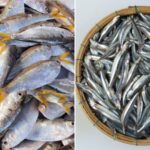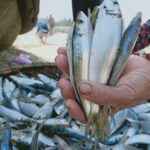## A Potential Link Between Seed Oils and Cancer: Unraveling the Complex Relationship
A recent study from UCLA School of Medicine revealed that eliminating seed oils from our diet may slow the progression of prostate cancer. These findings further emphasize previous discoveries linking certain seed oils to the risk of other cancers, such as colorectal cancer in younger individuals.
In a study involving 100 early-stage prostate cancer patients, scientists found that those who reduced their consumption of vegetable oils like canola and corn oil while increasing their intake of salmon experienced slower disease progression compared to the group that made no dietary changes.
The study suggested that the high levels of omega-6 fatty acids in seed oils could promote inflammation, potentially damaging tissues and creating a conducive environment for tumor growth.

The study suggested a link between omega-6 fatty acids in seed oils and increased inflammation
Why Are Seed Oils Potentially Harmful?
The answer lies in the high omega-6 content of these oils. Half of the study participants followed a diet low in omega-6 and high in omega-3, while the other half maintained their regular eating habits.
This meant that they consumed an equivalent number of calories but differed in the types of fats and nutrients they ingested. The group with reduced omega-6 and increased omega-3 intake minimized fried foods, potatoes, and grilled items, while incorporating omega-3-rich foods like tuna and salmon into their diets.
After a year, prostate tumor samples were taken and analyzed for chemical markers, providing researchers with insights into the development and transformation of the cancer.
The study revealed that, after a year, the tumors of those on the low omega-6 and omega-3-rich diet grew significantly slower than the other group. Notably, the invasive signs of the tumor in the dietary intervention group decreased by 15%. In contrast, the group without dietary changes experienced a 24% increase in biomarkers associated with cancer aggressiveness.
Previous research has indicated that omega-6 can contribute to chronic inflammation in the body, creating an environment conducive to cancer growth and invasion. On the other hand, omega-3, found in certain types of fish, exhibits anti-inflammatory properties, promoting overall health.
Earlier studies have also asserted that reducing omega-6 and increasing omega-3 intake may slow the progression of prostate cancer. The recent study reinforced this notion, as participants on the low omega-6 and omega-3-rich diet showed a significant reduction in tumor invasive signs after a year. Experts believe that these fats can be detrimental in two ways: they promote inflammation that fuels cancer growth and hinder the body’s immune response to fight off tumors.
In a notable study, Dr. William Aronson, a prominent urologist at the UCLA School of Medicine, drew a surprising conclusion: changes in diet may help slow the progression of prostate cancer. This goes against the stance of leading US health agencies, which maintain that seed oils are safe and unrelated to cancer or other diseases.
“This difference suggests that dietary changes may help slow cancer progression and potentially delay or even prevent the need for more aggressive interventions,” emphasized Dr. Aronson.

Dietary changes may play a role in slowing the development of prostate cancer
Vegetable Oils and Their Link to Colorectal Cancer
A recent study published in the journal Gut revealed a concerning association between seed oils and the risk of colorectal cancer. Researchers at the University of South Florida uncovered evidence suggesting that consuming large amounts of seed oils may increase the likelihood of developing this dangerous disease.
The analysis showed that the tumors had a high presence of inflammatory molecules, while the levels of healing molecules were very low. Professor Timothy Yeatman, who led the research, emphasized, “We have long understood that an unhealthy diet is closely linked to chronic inflammation in the body.”
Yeatman also suggested that the Western diet, characterized by high levels of inflammatory substances like seed oils, added sugars, and chemicals, is “fueling” cancer cell growth. He stressed that dietary modifications could become a powerful weapon in the fight against this type of cancer.
The Importance of Nutrition in Cancer Treatment
This study once again highlights the critical role of nutrition in cancer prevention and treatment. Adjusting one’s diet, particularly by reducing seed oil consumption and increasing omega-3 intake, could be a vital component of a comprehensive prostate cancer treatment plan.
While the current findings are promising, further research is needed to fully understand the mechanisms by which omega-6 and omega-3 affect cancer cells. Additionally, larger-scale studies are required to confirm these results.
In the meantime, cancer patients should consult with their doctors to make informed dietary changes. Simple adjustments, such as reducing seed oil intake and incorporating more fish, vegetables, and fruits, could have surprising health benefits.
The Ultimate Omega-3 Rich Fish: An Affordable Superfood Delight
When it comes to omega-3-rich foods, salmon often springs to mind, with its impressive 2,150mg of omega-3 per serving. However, what many people don’t realize is that there’s another type of fish readily available in Vietnam that rivals salmon in its omega-3 content. Step forward, herring! This humble fish boasts an impressive 2,150mg of omega-3 per serving, putting it on par with salmon as a superb source of these essential fatty acids.





































